| Reviews & Columns |
|
Reviews DVD TV on DVD Blu-ray 4K UHD International DVDs In Theaters Reviews by Studio Video Games Features Collector Series DVDs Easter Egg Database Interviews DVD Talk Radio Feature Articles Columns Anime Talk DVD Savant Horror DVDs The M.O.D. Squad Art House HD Talk Silent DVD
|
DVD Talk Forum |
|
|
| Resources |
|
DVD Price Search Customer Service #'s RCE Info Links |
|
Columns
|
|
|
Monsignor
Forgive me, Father,
for I have sinned.
I have killed for my country,
I have stolen for my church,
I have loved a woman,
and I am a priest.
Forgive them, Father, for they apparently knew not what they were doing. Shout! Factory has gone back to the vaults and released Monsignor, the 1982 clerical stiff about the Vatican and the mob starring Christopher Reeve, Genevieve Bujold, Fernando Rey, Jason Miller, Adolfo Celi, and Robert Prosky. Despite being written by heavyweights Abraham Polonsky and Wendell Mayes (from Jack-Alain Leger's novel), and directed by Mommie Dearest hit helmer Frank Perry, Monsignor didn't stand a chance in hell with angry critics and disinterested audiences back in '82 (everyone associated with this notorious flop saw their careers set back). Watching it now, what promising material it might have exploited is shot down by a curiously dispassionate approach and disastrous central miscasting. No extras for this okay transfer.
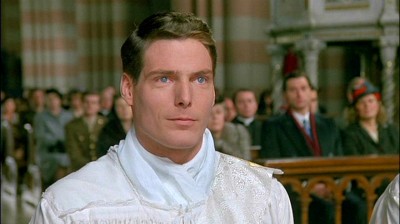
WWII America. Newly-ordained Brooklyn parish priest Father John Flaherty (Christopher Reeve), having enlisted as an Army chaplain, performs his first sacred duty: officiating at his best friend―and soon-to-be "wiseguy"―Ludovico "Lodo" Varese's (Joseph Cortese) wedding. Cut to the battlefields of Italy, where Father John, after seeing Private Joe Musso (Joe Pantoliano) buy it despite the dogface's entreaties for God to intervene, suddenly picks up a .50 caliber machine gun and mows down an advancing line of Germans, an act that gets him sent to the Vatican. Far from being disciplined, though, for this rather unorthodox method of sending souls to heaven, Father John is told by tough guy General/BishopWalkman (Robert J. Prosky) that the American contingent of the Vatican wants him to succeed. The American wing of the Catholic Church, Walkman asserts, is tired of playing second fiddle to distrustful, conservative Italians like Cardinal Vinci (Adolfo Celi), who view the Americans as interlopers to be kept out of the highest reaches of Vatican power. Bishop Walkman hands the ambitious Father Flaherty over to Cardinal Secretary Santoni (Fernando Rey), second only to the Pope (Leonardo Cimino), who needs Father Flaherty's financial expertise to keep the cash-strapped Vatican from going under during the hostilities. Flaherty's plan is to engage Lodo, now working for American gangster-in-exile Don Vito Appolini (Jason Miller), in black market activities to aid the Church financially, a dirty little sin that doesn't come close to Father John's other big transgression: a hot-and-heavy affair with postulant nun Clara (Genevieve Bujold).
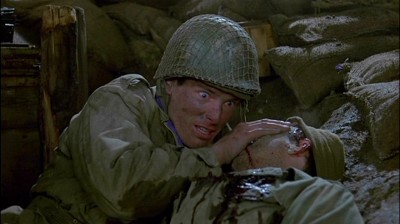
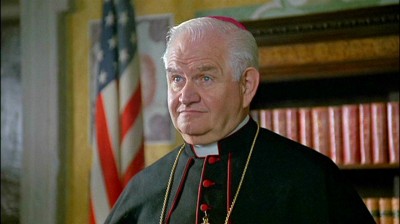
Monsignor holds a unique place in my teen movie-going memories because when I caught it at our local second-run Jerry Lewis Cinemas® (converted) duplex...I promptly fell asleep ten minutes into the film (and the last time that had happened, I was in my jammies at the drive-in). Watching it today, I didn't conk out, and I was actually quite intrigued by the story's possibilities...but let's just say it's fortunate I didn't catch it at one in the morning after a tiring day.
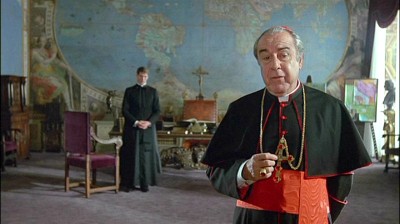
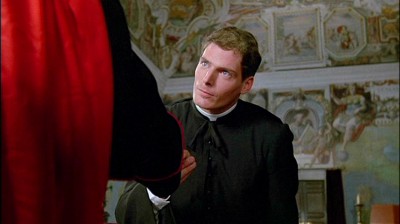
Half-heartedly reaching for the epic scope and would-be heavy-breathing scandal of Preminger's The Cardinal, as well as hoping to exploit that intriguing combo of organized religion and political corruption that permeated the previous year's far, far superior True Confessions, Monsignor comes up short on all three counts, curiously pulling its punches as it bogs itself down in too-slick, unemotional filmmaking. It's not like Monsignor is lacking in material; there are enough subplots for three good movies here: the ties between the tough Irish kid from Brooklyn who becomes a priest and his Italian hoodlum friend (like something out of an old Warner Bros. meller, with Cortese giving the film's best performance); the ties between the Vatican and the mob during WWII and then as players in the international monetary market; and the romantic, sexual ties between a priest and a postulant nun. Yet each one is played with and toyed with...and then dropped as another tangent is picked up, never satisfying us with adequate motivations for characters' actions, before we wonder how one scene connects with the other (obviously, big chunks of the movie were cut out at some point in post-production...or this was one disjointed script to start with).
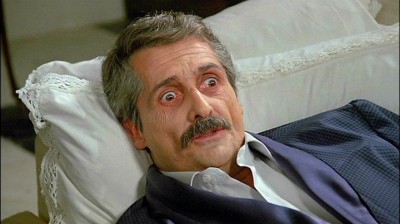
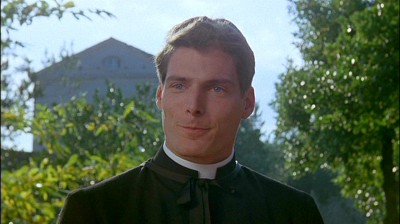
I don't particularly care if Monsignor is an "accurate" view of the Catholic Church and its dealings; I'm not looking for a history lesson here (besides, what good would a godless commie Marxist like co-scripter Polonsky have to say about the Church?). I don't care that Polonsky (Force of Evil, Madigan, Tell Them Willie Boy Is Here) and one of my favorites, Mayes (Anatomy of a Murder, Advise & Consent, Von Ryan's Express, The Poseidon Adventure, Death Wish), have opted for straight cynicism at best for this tale of the Vatican and how big religion equals big money and big corruption. If anything, that sour attitude should be the perfect launching pad for a whopping, juicy, melodramatic exploiter not at all hindered (in 1982) by censorship problems. Monsignor, then, should have some moxie if it's going to eschew True Confessions' downbeat realism for a more square, traditional approach. And that, unfortunately, is precisely what Monsignor doesn't have.
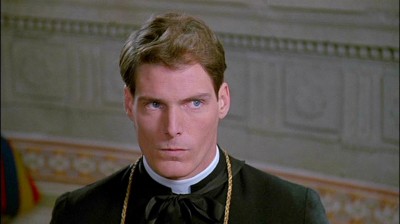
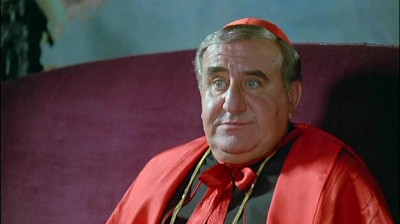
It's bad enough that we never get even an inkling as to why Reeve is as he is. Why is he so ambitious? A bad childhood? A yen for material goods? Overachiever? Ass-kisser? We're never told or shown. We find out why he mowed down all those Nazis (he felt God had deserted the fighting men), but we're in the dark as to why he takes up with Clara. Was he with women before her? Is this his "first time?" Did he do it as a result of the further corrupting of his soul? Or was the affair just a "perk?" No idea. So...if we can't get motivation in a serious drama, at least give us exploitation in a melodrama. I like the idea of the Church and the mob getting close during the war, a hypocritical union that could have been amplified by the blasphemous coupling of priest and nun...but Monsignor treats both with a strange "hands off" bloodlessness that's maddening at first, and then stultifying by movie's end. We're treated to matter-of-fact wheeling and dealing between priests and hoods, with Reeve as the conduit, but they might as well have been Rotary members jockeying for concession booths at a county fair, considering how their tribulations are so lifelessly and dully presented here. As for Reeve's affair with Bujold, at least the movie's poster shows them in bed together; in the movie we get an unfortunate topless scene with Bujold and that's it―if a torrid love scene was filmed between the mismatched stars, someone must have chickened out in post.
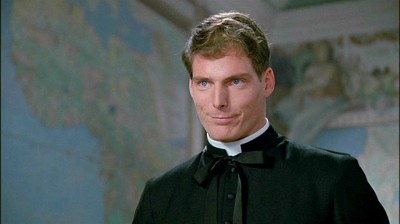
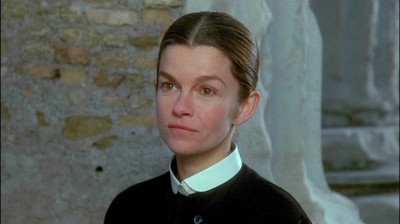
Indeed, one can assume at least part of Monsignor's problems lie in post-production tampering (how else do you explain that jarring decades-long jump cut between young Reeve admitting to his sins...and then presto chango, he's back with gray hair, hocking liras for dollars for Rey again?). Scenes kaleidoscope in and out from one event to the next with little or no set-up...nor pay-off. According to what I've read, Reeve blamed the film's final edit for this debacle, but you can tell that most individual scenes are flawed internally, with stilted scripting and a weirdly out-of-synch timing to the performances that spells an ill-conceived project from the outset (for the one or two genuinely funny lines like, "One is never witty...unless one is a cardinal," there are scores of howlers, like "You got faith. You got brains. You got balls. Use them discreetly," or this exchange between lovers Bujold and Reeve: "Who are you?" "I'm your lover." "You're my mystery...and it attracts me." Hee hee!). Dark intimations are put out there that somehow everything and everyone is linked in the story, but whether in pre or post, the dots aren't connected up for us (the set-up for Prosky's character is terrific...and then he just disappears). What's worse is how we're denied even the most basic (or base) pleasure of seeing unfettered moral corruption here; where's the drama, where's the conflict, where's the fun, if every time Reeve does something wrong...a cardinal or a Pope comes along and pats him on the head and says, "Itsa alrighta, youa good boya" (the classic is the final scene where Rey, condescendingly forgiving Reeve when he's just as guilty, hugs a teary-eyed Reeve as the camera pans over to a painting of Jesus...as if to say J.C. is ultimately cool with carnal lust, theft, corruption, and murder if it's for the Church)?
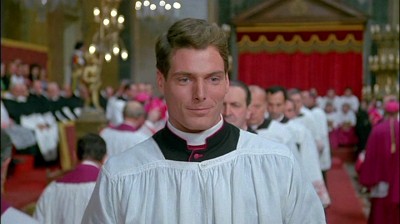
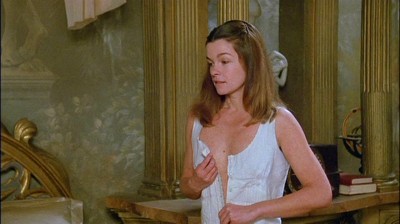
Monsignor's problems aren't just at script level, though. Director Frank Perry's (the hallucinatory The Swimmer and the perfectly outrageous Mommie Dearest) sometimes strange, odd, funereal approach worked brilliantly (or perhaps...inadvertently?) with the macabre Grand Guignol biopic, Mommie Dearest, but here, that same style is completely wrong for a story that should be purple with passionate bad taste. Why does Frank make everyone stand so stiff and motionless, acting as this garbage was actually serious drama when characters should be flying off the walls? This is a gangster movie, fercrissakes! It's an exploitation meller with a priest banging a nun while he's hustling black-market Hershey® bars and cigarettes between the Pope and Lucky Luciano-like Jason Miller! How hard is it to get some energy and some snap outta that set-up? And yet, the actors in Monsignor stand there as if they're in a David Lean film, with all that careful, dreadfully tasteful cinematography and art direction, and ask us to believe that these bloodless automatons are enacting the bloodiest of sins. It's ludicrous.
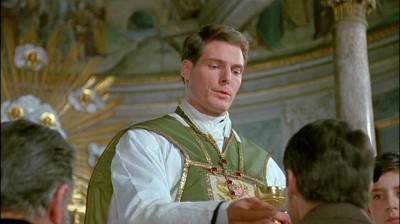
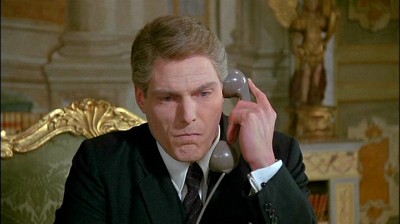
And none of this is helped by the miscasting of Reeve here as the Fiddling Father. I can sort of guess why he decided to take on Monsignor; after all, by 1982, his big screen career was already in serious jeopardy, what with all his non-Superman films performing less-than-optimally, to put it nicely, at the box office. Monsignor probably looked like something "edgy" that could allow him some showy, Oscar-worthy moments of emoting―safely encased, of course, in a big, glossy, supposedly can't-miss-hit studio effort. But why would producer Frank Yablans think the sniffy Reeve, who made no bones about implying he was "too good" for the movies he routinely appeared in, was a good match for this particular character? If distant, prep school polite, patrician Episcopalian Christopher Reeve is a tough Irish Brooklyn street kid-turned-tortured-Catholic Priest, then I'm a Chinese jet pilot. Reeve's intrinsic callowness and insincerity, his slick superficiality, actually fits this chiseler punk-with-a-collar at first...until you realize they're not going to explain how he got that way, or let the character grow or evolve in any believable manner. Reeve constantly has an annoying smirk on his face (when he isn't hilariously setting his stone face in an exaggerated, inadvertently comical frown) that's either his approximation of a hustler, or his annoyance at playing a character he later admitted he never believed in for a second. We get zero sense that the obviously disconnected Reeve is having any kind of inner spiritual dilemma, so ultimately, what's the point of his performance (at least poor Tom Tryon tried)? Reeve can't achieve an arc with his character because you never believe his Father was "good" to start with, or that he even possessed a belief in God (in a publicity article at the time, Reeve admitted his inability to summon up even the most basic artificial religious feelings for his character―I'll bet the producers loved reading that), so how can we appreciate his character's descent into moral turpitude? In two words, we can't. Monsignor's dirty little exploitation thriller is piously, hypocritically all dressed up as solemn high drama, and yet it doesn't have the faith, or the brains, or the balls, to be either.
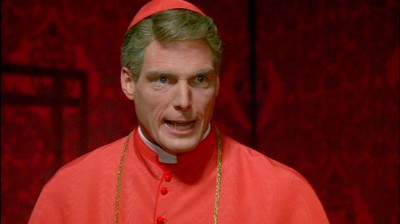
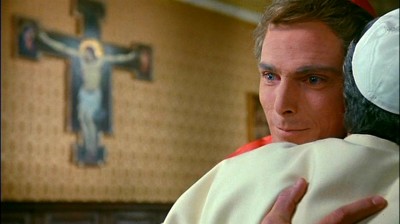
The DVD:
The Video:
The anamorphically enhanced, 1.78:1 widescreen color transfer for Monsignor looks just okay, with a somewhat faded print, slightly washed-out color, a sharpish image, and a fair amount of grain/video noise.
The Audio:
The English 2.0 stereo audio track is acceptable, with low hiss and unexceptional effects. No close-captions or subtitles available.
The Extras:
No extras for Monsignor (if I remember correctly, the original trailers were even more of a hoot).
Final Thoughts:
Probably ill-conceived from the get-go. While the story elements for Monsignor are solid (I'll bet a remake today would go over like gangbusters if somebody had the balls to do it right), the execution is timid and weak, emphasizing phony gloss and stiffness-of-performance in a failed bid for Lean-esque solemnity, while ignoring the possibilities of its real allure: pulpy, lurid melodrama ripe for exploitation. Christopher Reeve is hopelessly bad here...as usual for anything he did on-screen without a cape. A rental is recommended for lovers of completely misguided cinema.
Paul Mavis is an internationally published film and television historian, a member of the Online Film Critics Society, and the author of The Espionage Filmography.


|
| Popular Reviews |
| Sponsored Links |
|
|
| Sponsored Links |
|
|
| Release List | Reviews | Shop | Newsletter | Forum | DVD Giveaways | Blu-Ray | Advertise |
|
Copyright 2024 DVDTalk.com All Rights Reserved. Legal Info, Privacy Policy, Terms of Use,
Manage Preferences,
Your Privacy Choices | |||||||













